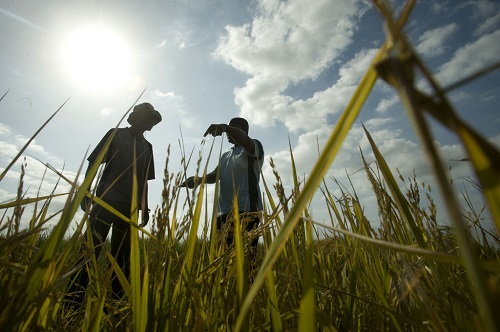CIF photo
By
Abebe Wolde Giorgis
The exacerbation of extreme weather conditions due to the prevalence of climate change and global warming critically affected the agricultural and food production sector. The struggle for realizing food security itself became a nightmarish venture. The incompatibility between the growing population and food production made the situation worse because the number of the population far exceeded the food supply.
Some experts argue that conventional agricultural research is outdated and incapable of feeding the growing population, hence utilizing transgenic seeds in farming can be a solution. Others who disagree with this argument suggest that agriculture, particularly in the developing countries, has unexplored potential and through selected seeds which are produced by the conventional hybrid system and with combining inputs such as fertilizer, pest and herbicides, food security can be realized.
Dr Tilye Feysa is an instructor in AAU Science Faculty Biotechnology department and according to him the conventional hybrid system enabled to produce a selected seed, which has a high productivity rate, might not have the capacity to resist drought or diseases, so the transgenic approach could bring a solution in this regard. In the conventional hybrid system gene crossing is made with similar specious, however in transgenic, breeding can be made among different plant specious, animals and bacteria by mixing the relevant DNA item relevant to the other specious.
He further said that the conventional hybrid system takes time, up to 15 years, for experimentation but the biotechnology can make the hybridizing easy and accomplished in a short period of time.
But still pro-conventional farming experts argue that traditional small scale farming has the potential to raise productivity without utilizing biotechnology. In this regard, Tiliye said that before involving the new approach, comparing the new technology with the conventional one is essential. In addition, it is necessary to sort out the positive and negative outcome of the technology. According to him it was traditionally thought that through the expansion of farm land, rising agricultural productivity was possible but by now this is not working due to the population explosion, farm land shrinking and its productivity declining.
The scarcity of water also makes the matter worse, thus to address the problem new thinking is prevailing which accepts the provision of extension services to farmers including biotechnology so that achieving productivity in small plots is possible.
Most farmers have financial limitations to utilize agricultural inputs qualitatively and quantitatively in conventional ways whereas in advanced countries farmers don’t have such limitations and produce the highest amount of crops per hectare. Thus according to Tilye, biotechnology is preferable for developing countries such as Ethiopia because it produces disease and pest resistance which utilizes less input. In addition, even though fertilizer can raise output, it might have its own negative impact on the environment.
On the other hand, the effectiveness of the input is also determined by the quality of the soil and seed. Biotechnology mainly focuses on the improvement of the genetic potential of the plant, however utilization of inputs such as fertilizer should not be denied. But it must be understood that before applying biotechnology the merit and demerit aspect of the technology should be examined.
One of the negative aspects of biotechnology is that the spread of transgenic pollen to other farm and wild plants by wind, insects and animals, consequently may threaten the biodiversity by creating new super-weeds.
Scientists refer to such phenomena as horizontal gene transfer which occurs without the will of the farmers. Therefore, in order to avert the risk, applying the procedure of the rules of bio safety is vital, as farms in the nearest areas and the wild specious should not be affected.
The Ministry of Environment and Climate Change have the mandate to supervise and give license to the institutions which are interested in engaging in transgenic plant research and experimentation.
According to the law, before the planting of transgenic plants, the area will be examined and the botanic file of the place checked and if there are similar specious that might be capable of being hybridized, planting the transgenic plant will be cancelled and according to the botanic law, within the radius of 200 meters other farm plants which have similar genes should not be there. But if the area is free from similar specious, the plantation will take place.
Asked whether the biotechnology application helps to ensure food security in other countries, Tilye said that most countries evaluate the technology not according to its impact in specific crops but on the broad scale of economic impact.
For example, whether it enhances productivity in industrial crops such as cotton plants, which could be used as an input in the labor intensive textile industries, creating job opportunities for tens of thousands.
In this regard, the Asian and industrial countries are ahead of Africa. Countries such as South Africa, Burkina Faso and Sudan have already began planting BT cotton which is a genetically modified crop in order to enhance their cotton plantation farm productivity, utilized as an input for the textile industry.
These countries preferred the utilization of biotechnology in industrial crops to avoid the possible risk in food crops.
Yet the argument between pro and against biotechnology experts continued. Experts who are against the utilization of the technology argue that the spread of biotechnology focuses on the maximization of the multinational corporation profit margin which is established for business rather than ensuring food security.
In addition to this, once farmers are familiar with GMO seeds, they become dependent on the foreign companies and food sovereignty of the recipient countries put in question.
Furthermore, the farmers’ traditional knowledge of crop types, and in the long run food cooking culture, will deteriorate and vanish. But to balance the pro and against biotechnology, Tilye suggest that instead of importing biotechnology which opens the door for dependency, developing the technology by local scientists and then disseminating the improved seed cautiously to farmers should be taken as a way out.
To summarise, we should not deny the positive impact of biotechnology on enhancing farming productivity, but not to compromise.
Abebe Wolde Giorgis
Abebe Wolde Giorgis was born in Harar, Ethiopia. He has a B.A from Addis Ababa University in English Language and Literature, Minor History.
For 17 years he has been a Journalist in local and International Media, Amharic and also an English Newspaper.He wrote several articles on environment and economics.
Member of Environment journalist association, he was deputy editor in chief of an Amharic Newspaper and Senior Editor of the Ethiopian Herald.



No Comments Yet!
You can be first to comment this post!